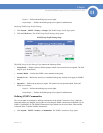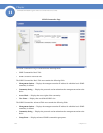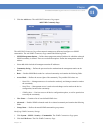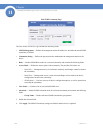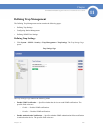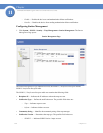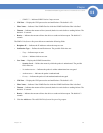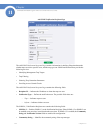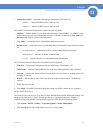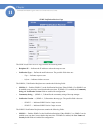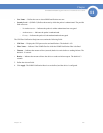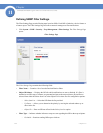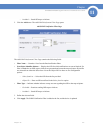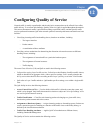
193
Chapter 11:
SFE2000/SFE2000P Gigabit Ethernet Switch Reference Guide
Chapter
11
• Notification Version — Determines the trap type. The possible field values are:
– SNMP V1 — Indicates SNMP Version 1 traps are sent.
– SNMP V2 — Indicates SNMP Version 2 traps are sent.
The SNMPv3 Notification Recipient area contains the following fields:
• SNMPv3 — Enables SNMPv3 as the Notification Recipient. Either SNMPv1,2 or SNMPv3 can be
enabled at any one time, but not both at the same time. If SNMPv3is enabled, the User Name and
Security Level fields are enabled for configuration:
• User Name — Defines the user to whom SNMP notifications are sent.
• Security Level — Defines the means by which the packet is authenticated. The possible field values
are:
– No Authentication — Indicates the packet is neither authenticated nor encrypted.
– Authentication — Indicates the packet is authenticated.
– Privacy — Indicates the packet is both authenticated and encrypted.
The UDP Port Notification Recipient area contains the following fields:
• UDP Port — Displays the UDP port used to send notifications. The default is 162.
• Filter Name — Indicates if the SNMP filter for which the SNMP Notification filter is defined.
• Timeout — Indicates the amount of time (seconds) the device waits before re-sending informs. The
default is 15 seconds.
• Retries — Indicates the amount of times the device re-sends an inform request. The default is 3
seconds.
3. Define the relevant fields.
4. Click Apply. The SNMP Notification Recipient settings are defined, and the device is updated.
Modify SNMP Notifications
The SNMP Notification Receiver Page allows system administrators to define notification settings. The
SNMP Notification Receiver Page is divided into four areas, Notification Recipient, SNMPv1,2
Notification Recipient, SNMPv3 Notification Recipient and UDP Port Notification Recipient.
1. Click System > SNMP > Security > Trap Management > Station Management.
2. Click the Edit button. The SNMP Notification Receiver Page opens:



